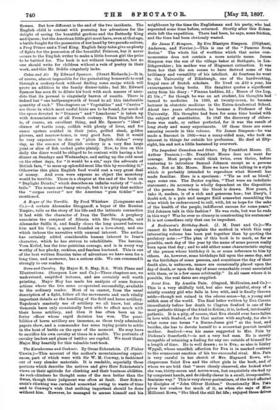Series." The whole list of worthies which that series com-
memorates does not contain a more notable name. James
Simpson was the son of the village baker at Bathgate, in Lin- lithgowshire ; his mother was of Huguenot extraction. It was from her that the son seems to have derived some of the brilliancy and versatility of his intellect. At fourteen he went to the University of Edinburgh, one of the hardworking, frugal race of Scotch scholars. He lived on £10 a year, his extravagance being books. His daughter quotes a significant entry from his diary : " Finnan haddies, 2d. ; Bones of the Leg, £1 102. ; " for though he was an art student, his thoughts had turned to medicine. In 1838, at twenty-seven, he became lecturer in obstetric medicine in the Extra-Academical SchooL About two years afterwards, he became a Professor of the University. His thoughts had been for some time busied with the subject of antesthetics. In 1847 the discovery of chloro- form was made, or rather perfected, for it was the result of long study and many experiments. Of these there are some amusing records in this volume. Sir James Simpson—he was made a Baronet in 1866—was a many-sided man, who took an interest in things far outside his profession. He died at fifty- eight, his end not a little hastened by overwork.






































 Previous page
Previous page